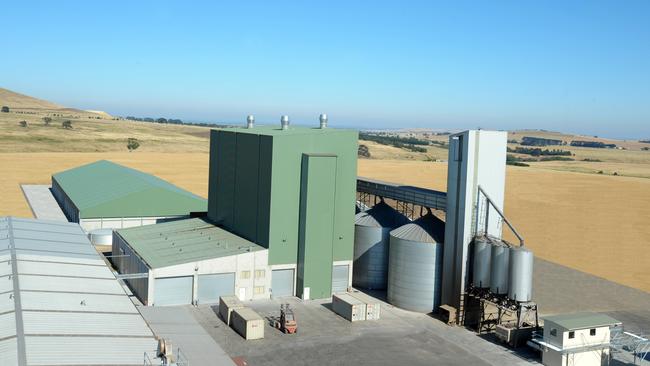Unigrain to build field pea and faba bean protein fractionation plant at Smeaton
Ambitious plans by a central Victorian company have plenty of upsides for local food manufacturers and growers. Here’s why.

Central Victorian company Unigrain is planning to install a pulse fractionation plant at its grain processing operation at Smeaton to capitalise on the demand for plant-based foods.
Unigrain produces high value oat and pulse products for the export market but the German-built protein extraction technology would take the company to a new level.
The new plant will become the first fully integrated pulse milling and fractionation plant in Australia and has potential to displace imported ingredients used in the local manufacture of many foods.
Joint chief executive officer Andrew May, who ran the company with sister Fiona, said the Smeaton operation processed about 30,000 tonnes of pulses for the export market, namely split field peas and split faba beans for human consumption.
Unigrain also processes oats into packaged cereal and granola products for markets such as Vietnam and China.
The company was established by Andrew and Fiona’s father, Bill, and was now half-owned by Costa Asset Management, a family business run by Robert Costa.
Mr May said the new fractionation plant had capacity to process 40,000 tonnes of field peas and faba beans into protein concentrates for the plant-based foods sector.
“We saw this as an attractive area to expand into,” he said.
“There is no doubt the demand for plant and pulse-based products is growing rapidly.
“We’re really excited about this because it’s a fast-growing and innovative space.”
Mr May said the new equipment used a technique called air classification to separate the protein particles from the starch fraction of pulses without the use of water or chemicals.
The fibrous hull was be used in Unigrain’s feed mill at Smeaton to produce animal feed products.
He said the starch could be used in a range of products, such as for dairy cattle feed, pet foods, or in human food, such as gluten-free pastas.
He said the fractionated protein concentrate would be sold to Australia food manufacturers.
Mr May said the Australian plant-based food market was heavily reliant on imported protein ingredients, nearly all of which was sourced from North America or Europe.
“There is no reason why all imported products could not be replaced by Australian product.”
Mr May said the new plant had benefits for the local pulse industry by broadening the market and offering more flexibility over the quality requirements.
He said the fractionation plant could use broken grains as well as whole pulses.
Unigrain was also considering the development of a broader range of grains for fractionation, including lentils, chick peas and oats.
MORE
UNIGRAIN DEVELOPS FEED PELLETS FOR ASIAN MARKET


